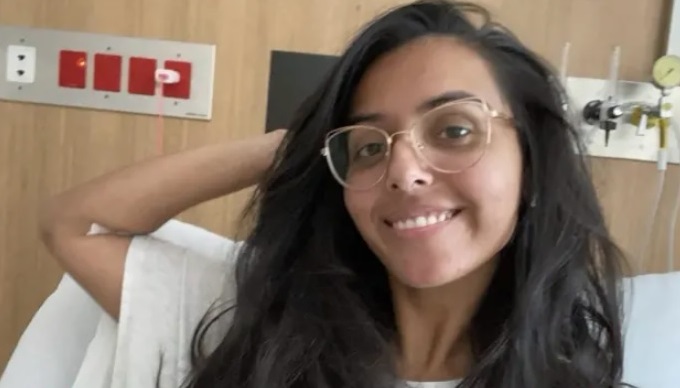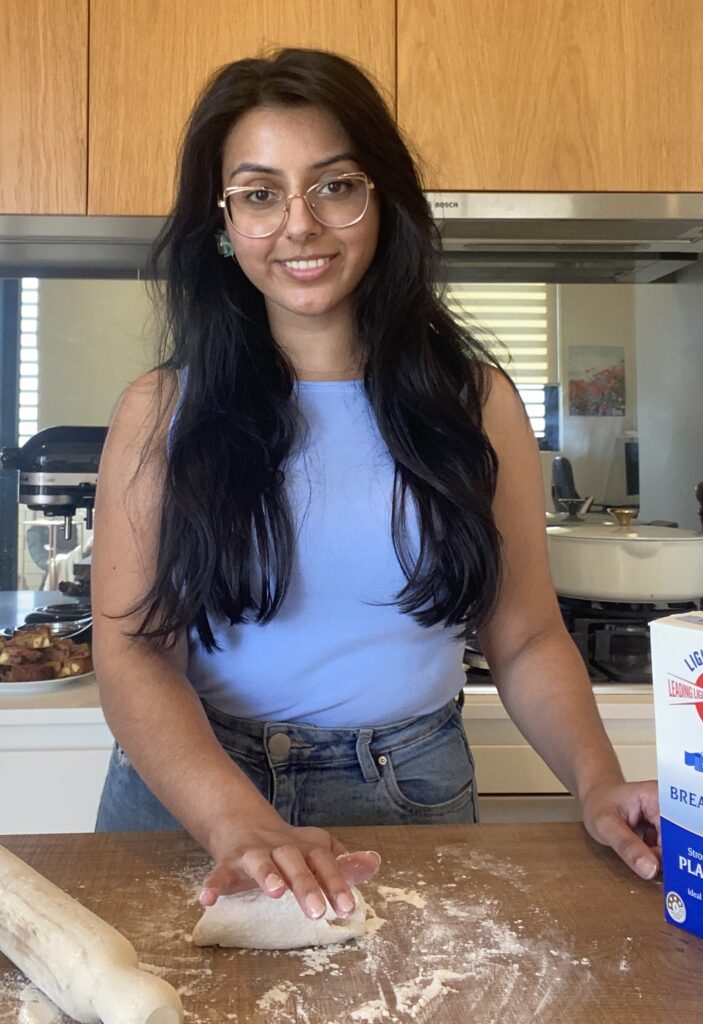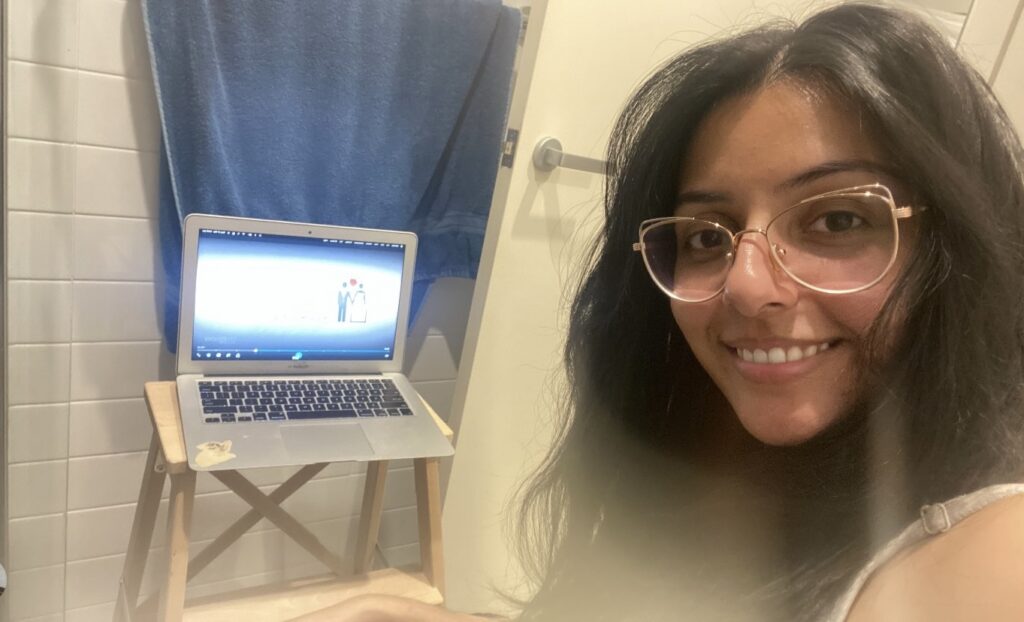“Once I received a diagnosis, I was more able to piece all the dots together” – Sandeep’s story

I’ve experienced IBD symptoms since I was 10. At different times, that’s included bowel movements after every meal – seven to 12 bowel movements a day – as well as rectal cramping that was particularly bad when I was on my period. It got to the point where I couldn’t sit on a hard surface because of extreme abdominal pain. Every time I went to the GP, they put it down to anxiety, stress or other psychological issues. I’d had iron infusions, blood transfusion, ultrasounds, and it wasn’t until I saw a random GP when I was 24, that he actually referred me to a gastroenterologist. I didn’t know what a gastro was at that time. And it was just one random GP who was really the catalyst for my diagnosis journey. Because I didn’t want to take time off work, I delayed my initial scope by about 10 months after receiving the referral. Those results came back as inconclusive, so the gastro specialist referred me to a further specialist who ran a stool test and a blood test. In conjunction with some biopsies that suggested inflammation, he diagnosed me with ulcerative colitis. I was 26 when that happened, so it took me over 15 years to receive that diagnosis, My biggest gripe is that every GP I saw put it down to something that was psychological, or that my pain was just connected to menstruation because I’m a female.
Since the UC diagnosis, I’ve been more informed to rest and listen to my body. It’s compelled me to engage a little bit more with my hobbies – going back to things like reading and art, and spending more time with my siblings, which I didn’t do as much of pre-diagnosis. In terms of the negative impact. It’s a constant reminder of my limitations. It can also be incredibly isolating. Every time I think of my IBD, it reminds me of the careers and the relationships and hobbies I’m not able to pursue. There’s also this pervasive feeling of unworthiness, as I’ve had two relationships end because of the IBD.) There’s also a significant financial impact. When my flare was really bad, I was spending anywhere between $600-$800 a month on gastro and psychologist appointments, non PBS listed steroids, and biologics, and having to think carefully about the types of careers that I can pursue. At times, I’ve had to step down from work roles, and that’s come with a really significant pay cut.
I’m very lucky to have friends who, despite not experiencing what I’m going through, are very empathetic. They let me call the shots about the activities we do, where we go to eat, if we go out to eat, and if we’re just sitting on my couch because I’m in that much pain. They’re so generous with their compassion. I think if I didn’t have a support network like that, I would push more to connect with a group of people who do have IBD.


Regarding services, the most helpful thing for me was changing specialists, and working with a specialist who is actually part of an IBD clinic. I have found it extremely hard to figure out what makes a good specialist. Do I Google “best IBD specialist Sydney?”. There’s no way to really ascertain that. And interestingly, I went to a specialist who had pretty bad Google reviews for bedside manner. He was the first medical professional to say to me, “your current medication is working, but it’s not good enough that you’re still experiencing symptoms that stop you from living your life.” He treated me like a human being who has goals and ambitions. Seeing a specialist connected to an IBD Clinic has also meant that I have a lot more trust in the process in terms of dealing with the administrative side of managing the illness. I also rely a fair bit on technology for managing symptoms and understanding my trigger foods. I use an app called mysymptoms which is great, and one called P-Cal which has been really helpful. If I’ve had a flare, I can show a healthcare professional this data rather than relying on my memory
I presented at an Abbvie Forum last year as a patient advocate. I’m still really grateful that I was able to do that. I had lofty dreams when I was a teenager. When I was in Uni, I was aiming to work for the UN, or in Australian Law Reform. Due to a long diagnosis journey and worsening symptoms, my health deteriorated, and I felt like I couldn’t make a meaningful contribution to the world. I was just a shell of a human. So that opportunity on a personal level helped me understand that, as a patient with a story, I can have a real impact. These patient presentations to healthcare professionals also places a human in the middle of all the science, research and numbers, bringing it to life. The feedback that I received was that my talk was extremely candid. But I think it’s important to present just how challenging and disruptive some of the symptoms can be, and the impact that they can have.
I’m going much better now. I was in hospital three time in one year because of flares, and I had a bowel infection twice, which made it difficult for me to respond to medication. I was on five different types of treatments before my current medication, which is the only one I’ve been able to respond to. In terms of symptoms, it was so bad that I’d have a sip of water and run to the bathroom. I couldn’t go on a five minute walk around the block without urgently needing the bathroom. Now I can be out of the house for several hours and be okay, which is amazing. I’ve been incontinent in public before and, once that happens, I feel like nothing scares you. That’s pretty horrific. At the moment, my specialist plan is to manage symptoms that withstand diet and lifestyle changes. I’m hopeful that, now I’ve got a bit more energy, I can focus more on the dietary side of things. I remember when I called the dietitian, and she asked me what my goals were. My response was to eat broccolini again. I love broccolini, and I haven’t had it for three years. With IBD, I’ve found it’s helpful to be incredibly realistic about my goals, and the life I’m going to live.
If a female walks into your practice and complains about abdominal pain, please don’t tell her it’s just because of her period. I would have liked for a psychologist to suggest that I see a GP about my gastro symptoms. We use holistic healthcare once we’re diagnosed, but we don’t do it to yield a diagnosis. Once I received a diagnosis, I was more able to piece all the dots together. I also wish people understood that – for a healthy person – their body is a vehicle for them to explore life in a relatively uninhibited way. Whilst my IBD is a constant reminder of my limitations and losses, it represents something much bigger – the importance of self-advocacy, resilience and maintaining hope for a cure.